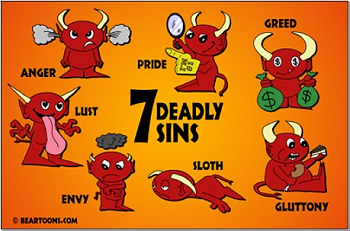and THE DAUGHTERS OF
THE SEVEN DEADLY
SINS
“Sin is nothing else than a morally bad act (St. Thomas, De malo, 7:3),
an act not in accord with reason informed by the Divine law.”
“Since the time of
Pope St. Gregory the Great (who lived from 540 – 604 AD) the Catholic Church
has maintained that there are seven capital sins, also referred to as the seven
mortal sins, seven deadly sins, or seven capital vices. Mortal sin refers to
sin, due to action and intention, which is of a graver nature than venial sin.
Where venial sin is relatively minor, mortal sin creates the threat of eternal
damnation, a full turning away from God on the part of the sinner, unless
absolved of the sin...”
The disorder introduced into our human nature by Adam’s fall
from grace reveals itself especially through seven dominant vices known in the Catholic tradition as the capital
sins. These are: pride, avarice, lust, anger, gluttony, envy, and
sloth. We call them “capital” sins (from the Latin caput, “head”) because they
are the sources or fountainheads of all the sins people commit, whether sins of
commission or sins of omission.
We call them “deadly”
because they cause spiritual death; Archbishop Fulton J. Sheen liked to
call them the “seven pallbearers of the soul.”
To Remember The 7 Deadly Sins Use The Acronym
P-A-L-E-G-A-S
PRIDE, ANGER, LUST, ENVY, GLUTTONY, AVARICE,
SLOTH
PRIDE – Pride is
an unrestrained and improper appreciation of our own worth. This is listed
first because it is widely considered the most serious of the seven sins; pride
often leads to the committing of other capital sins. Pride is manifest in
vanity and narcissism about one’s appearance, intelligence, status, etc. Dante
described pride as “love of self perverted to hatred and contempt for one's
neighbor.”
GREED – Greed,
which is also known as avarice or covetousness, is the immoderate desire for
earthly goods, as well as situations such as power. It is a sin of excess. The
object a person is greedy about need not be evil, but the issue lies in the way
one regards the object, placing inappropriate value on it. Greed can further
inspire such sinful actions as hoarding of materials or objects, theft and
robbery, trickery, and manipulation.
GLUTTONY –
Gluttony, which comes from the Latin gluttirei – to gulp down or swallow,
refers to the sin of over-indulgence and over-consumption of food and drink.
The manners in which gluttony can be committed, as first mentioned by Pope
Gregory the Great and later reiterated by Thomas Aquinas, are eating too soon,
eating too expensively, eating too much, eating too eagerly, eating too
daintily, and eating wildly.
St. Alphonsus Liguori explained that “it is not a fault to
feel pleasure in eating: for it is, generally speaking, impossible to eat
without experiencing the delight which food naturally produces. But it is a
defect to eat, like beasts, through the sole motive of sensual gratification,
and without any reasonable object” (The True Spouse of Jesus Christ).
LUST – The sin of
lust refers to impure desire of a sexual nature. Sexuality is a gift from God,
and not inherently impure in itself. However, lust refers to the impure
thoughts and actions that misuse that gift, deviating from God’s law and
intentions for us. Indulging in the sin of lust can include (but is not limited
to) fornication, adultery, bestiality, rape, and incest and can lead to such
things as sexual addiction.
SLOTH – Sloth is
often described simply as the sin of laziness. However, while this is part of
the manifestation of sloth, the central problem with sloth as a capital sin is
spiritual laziness. The sin of sloth means being lazy and lax about living the
Faith and practicing virtue.
THE DAUGHTERS OF THE
SEVEN DEADLY SINS
were explained by St. Thomas Aquinas as Sins relating to the 7 Deadly sins they are:
PRIDE
Disobedience, boastfulness, hypocrisy,
contention, obstinacy,
discord, love of novelties (too much about fashion,
etc.)
ANGER
indignation, swelling of the mind,
clamor (raising your voice), blasphemy, name calling, quarrels.
LUST
blindness of the mind, thoughtlessness, inconstancy,
impulsiveness, self-love, hatred of God, love of this world,
contempt for the
future world.
ENVY
hatred, tale-bearing, detraction,
joy of
our neighbour’s misfortunes,
and grief of others’ prosperity.
GLUTTONY
unseemly joy, vulgarity, uncleanness of
mind
and dullness of mind as regards to understanding,
loquaciousness (talking
too much),
excessive food or pleasure, drunkenness.
AVARICE
obsession of money or coveting what
other people have, treachery, fraud, falsehood,
perjury, restlessness, violence
and insensibility to mercy.
SLOTH
malice, spite, faint-heartedness,
despair,
sluggishness in regard to the Ten Commandments,
wandering of mind
after unlawful things.




